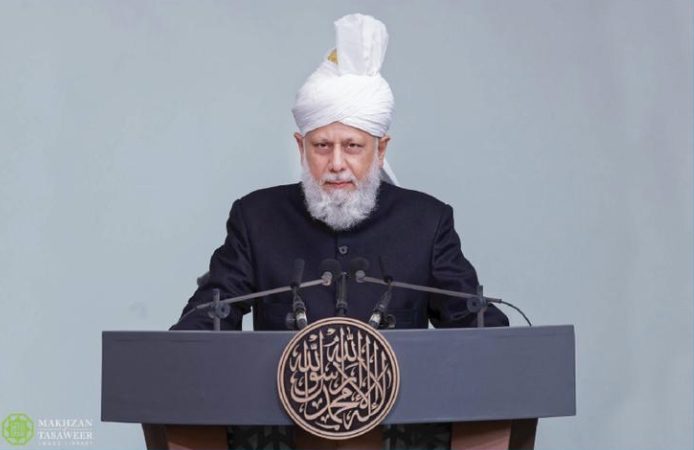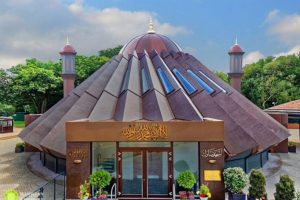After reciting Tashahhud, Ta’awwuz and Surah al-Fatihah, His Holiness, Hazrat Mirza Masroor Ahmad (aba) said that he would continue mentioning details regarding the Conquest of Makkah.

How Long Did the Holy Prophet (sa) Remain in Makkah?
His Holiness (aba) said that there are various opinions regarding the length of the Holy Prophet’s (sa) stay in Makkah. Most narrations mention that the Holy Prophet’s (sa) in Makkah lasted for 19 days, including travel to and from Makkah. There are some other narrations which mention fewer days, as they do not include the travel days.
Orientalists on the Conquest of Makkah
His Holiness (aba) quoted some orientalists, such as Sir William Muir and Sir William Montgomery, who have written about the Conquest of Makkah. Though they have been critical of Islam, they attested to the fact that the Makkans were not coerced into accepting Islam; however, the Holy Prophet (sa) showed them that they would all be treated with justice, thereby creating an environment of unity. The Holy Prophet (sa) had the foresight to envision a united Arabia that would be a recognised force throughout the world, and it came to pass that the great powers of Arabia bowed their heads before the Holy Prophet (sa).
His Holiness (aba) quoted an American orientalist named Arthur Gilman, who writes about the Conquest of Makkah, that when the Holy Prophet (sa) mounted his trusted camel and entered Makkah, he was extremely grateful because he saw the streets to be empty, indicating that he would be received peacefully. The Holy Prophet (sa) ordered that there should not be any bloodshed, and even the small battle that Khalid bin Walid had to engage in was displeasing to him. The Holy Prophet’s (sa) first order of business was to purify the Ka’bah of the idols that resided within it. Thereafter, he instructed the caller to climb atop the Ka’bah to call people to prayer. Only 10-12 people who had committed heinous crimes in the past were ordered to be punished, out of which four were given the capital punishment. However, compared to any other victor, whether the manner in which the Muslims were made to face cruelties when Jerusalem was conquered, or the injustices when the Gold Coast was conquered, the Holy Prophet (sa) displayed great mercy and announced a general amnesty.
His Holiness (aba) quoted an American orientalist named Ruth Cranston who said that only ten years after being pelted with stones and driven out of Makkah, the Holy Prophet (sa) returned with ten thousand Muslims and entered Makkah. The Holy Prophet (sa) instructed that no one should be killed and the Makkans should be treated with kindness. Had anyone other than the Holy Prophet (sa) been in command, then imagine the bloodshed that would have taken place. The Holy Prophet (sa) extracted every idol one by one from the Ka’bah and destroyed it, whilst proclaiming ‘truth has come and falsehood had vanished.’
His Holiness (aba) quoted Karen Armstrong, a renowned English orientalist who says that the Holy Prophet (sa) had no interest in bloody revenge. No one was forced to accept Islam, nor did the Holy Prophet (sa) wish to do so. Instead, he wished to establish unity and harmony. Through the Conquest of Makkah, Muhammad (sa) showed the truthfulness of his prophethood. His staunchest enemies became extremely devoted companions.
Repentance of Abdullah bin Sa’d bin Abi Sarh
His Holiness (aba) said that another incident from the time of the Conquest of Makkah is the repentance of Abdullah bin Sa’d bin Abi Sarh. He had accepted Islam and was a scribe of revelation; however, he had become an apostate and left Islam. At the time of the Conquest of Makkah, he hid in the home of Hazrat Uthman bin Affan (ra), who was his foster brother. Hazrat Uthman (ra) brought Abdullah to the Holy Prophet (sa) and asked him to accept his pledge of allegiance. After a pause, the Holy Prophet (sa) accepted his pledge of allegiance. Later, the Holy Prophet (sa) explained that he had paused in case one of the Muslims would wage a lethal attack against him. The companions asked why the Holy Prophet (sa) had not indicated as such, to which the Holy Prophet (sa) replied that it does not behove a prophet to make such indications. His Holiness (aba) commented that the narrations recounting this incident do not seem trustworthy, as this was contrary to the conduct of the Holy Prophet (sa). There are also other narrations which simply mention that the Holy Prophet (sa) granted Abdullah bin Sa’d protection, and there is no mention of killing him. His Holiness (aba) again stressed that the authenticity of the narrations in which this incident has been mentioned is questionable, and these narrations are weak.
His Holiness (aba) also said that it is clear there is no punishment for apostasy in Islam. Hence, there can be no truth to any statement that the Holy Prophet (sa) instructed for Abdullah bin Sa’d to be killed on account of his apostasy. Furthermore, the way in which this incident has been stated contradicts the honour of the Holy Prophet (sa). On that day, the Holy Prophet (sa) exhibited the highest forms of mercy and forgave anyone who sought forgiveness, even if they had been sentenced to capital punishment. Furthermore, such narrations are not found in the authentic books of Bukhari and Muslim. In addition, the Holy Prophet (sa) was a victorious leader, and if he wanted someone to be handed the capital punishment, he had no need to indicate it through gestures; rather, he could have clearly stated that he should be handed the capital punishment. However, it is not appropriate to attribute such things to the Holy Prophet (sa), as if to say that the Holy Prophet (sa) desired one thing in his heart but did not indicate it with a gesture or with his eyes. That day is characterised by the Holy Prophet’s (sa) mercy. Hence, the narrations associated with this incident cannot be accepted, and this is why many historians have also disregarded any mention of this purported incident. In fact, it is recorded that Abdullah bin Abi Sarh went on to become the Governor of Egypt.
Fulfilment of the Prophecy Regarding Ikrimah bin Abi Jahl
His Holiness (aba) said that there is also the incident of Ikrimah bin Abi Jahl accepting Islam. Ikrimah was among those for whom a warrant of capital punishment had been issued. He and his father had perpetrated great cruelties against Muslims. When he heard about this warrant, he fled towards Yemen. It is also possible that the Makkan chieftains themselves had deduced that, due to their cruelties against Muslims, they would certainly be killed and that they should flee. They had not estimated the great kindness, forbearance and mercy of the Holy Prophet (sa). However, as they came to learn of the Holy Prophet’s (sa) mercy, they began coming back to Makkah. Ikrimah gathered a contingent of brave Makkan soldiers and tried to stop Khalid bin Walid (ra) from entering Makkah. However, after seeing about 20 of their comrades being killed, Ikrimah and some others fled.
When Ikrimah’s wife heard that her husband had fled for fear of death, she went to the Holy Prophet (sa) and requested amnesty for him. The Holy Prophet (sa) said that Ikrimah was forgiven, and so his wife went after him to tell him that he had been forgiven and that he should return to Makkah. When Ikrimah returned and met with the Holy Prophet (sa) he said that he had been informed by his wife that he could peacefully live in Makkah even whilst remaining a disbeliever. The Holy Prophet (sa) said that this was true. Upon hearing this, Ikrimah professed his faith in One God and his belief that Muhammad (sa) was His Messenger. The Holy Prophet (sa) said that he would grant whatever Ikrimah requested on that day. Ikrimah requested that the Holy Prophet (sa) pray for Ikrimah to be forgiven for all of his trangressions against the Holy Prophet (sa); hence, the Holy Prophet (sa) prayed for his forgiveness. Then, the Holy Prophet (sa) gave Ikrimah his own cloak.
His Holiness (aba) said that Ikrimah’s acceptance of Islam proved the fulfilment of a prophecy. Years prior, the Holy Prophet (sa) had seen a dream in which he was in Paradise and saw a bunch of grapes. Upon inquiring whom it was for, the Holy Prophet (sa) was informed that it was for Abu Jahl. The Holy Prophet (sa) thought to himself that only believers were to enter paradise. Later, it became clear that this bunch of grapes from paradise were for Abu Jahl’s son, who became a believer.
Habbar bin Aswad’s Acceptance of Islam
His Holiness (aba) said that there is also the incident of Habbar bin Aswad fleeing and then accepting Islam. He would often incite people against the Holy Prophet (sa) and was himself a very immoral person. He was also the person who attached Hazrat Zainab (ra) while she was pregnant, causing her to miscarry and herself to remain ill for her remaining days. A warrant for his capital punishment had been issued, and so when the Conquest of Makkah happened, he fled and remained in hiding. When the Holy Prophet (sa) returned to Madinah, he presented himself before the Holy Prophet (sa). The Holy Prophet (sa) instructed the companions to leave him alone. He met with the Holy Prophet (sa) and accepted Islam. He said when he was in hiding, he heard about the great kindness of the Holy Prophet (sa) and sought forgiveness for all the transgressions he had committed against the Holy Prophet (sa). It is recorded that as Habbar sought forgiveness, the Holy Prophet’s (sa) head remained bowed in humility. He accepted Habbar’s plea and forgave him. His Holiness (aba) commented that how could it have been – as some people try to assert – that the Holy Prophet (sa) would have wanted Abdullah bin Abi Sarh to be killed, while he forgave Habbar bin Aswad? This further proves the invalidity of the narrations regarding Abdullah bin Abi Sarh.
Ka’b bin Zuhair’s Acceptance of Islam
His Holiness (aba) said that Ka’b bin Zuhair also came to accept Islam. Previously, he had become very upset at his brother’s acceptance of Islam, and he wrote poetry to incite violence. However, later, Ka’b was left with no choice but to submit before the Holy Prophet (sa) and seek forgiveness and he accepted Islam while the Holy Prophet (sa) was in Madinah. On this occasion, Ka’b recited a poem that he had composed to seek forgiveness and honour the Holy Prophet (sa). Upon hearing it, the Holy Prophet (sa) granted the cloak he was wearing to Ka’b.
His Holiness (aba) said that he would continue mentioning these incidents in the future.
Guidance for the Upcoming Annual Convention
His Holiness (aba) said that next week, the Jalsa Salana (Annual Convention) of the Ahmadiyya Muslim Community UK would commence. His Holiness (aba) prayed that may Allah make this Jalsa blessed in every way and continuously shower His blessings upon it. May Allah protect against the ploys of anyone who seeks to cause any sort of harm. May Allah bring all the guests safely to the Jalsa, whether from within the country or from abroad and may He keep them in His protection.
His Holiness (aba) said that all guests would be taken care of by the Hospitality department. May Allah enable all hosts to properly tend to the guests. Volunteers very happily and passionately present themselves to perform duties at the Jalsa. May Allah enable them all to selflessly serve in their respective departments. May they respectfully and cheerfully serve the guests. Sometimes, the sheer amount of work and the added lack of sleep can impact the cheerfulness of volunteers; however, every volunteer, no matter which department they are in, should bear in mind that Allah has granted them the opportunity to serve the guests of the Promised Messiah (as). Hence, they should pledge to make every sacrifice to uphold their spirit of service while keeping a smile on their face.
His Holiness (aba) said women or men, girls or boys, young or old, officers or volunteers, cooks or those serving in security or parking, cleanliness and hygiene or discipline, those on duty in the children’s marquee or those serving in the main Jalsa hall, everyone should always keep a smile on their face while rendering their duties. May Allah enable everyone to do so. At the same time, everyone should keep a watchful eye, so that no one is ever bold enough to cause any sort of harm. May Allah enable all volunteers to render the best service and may they reap the rewards of Allah the Almighty.
Summary prepared by The Review of Religions




Add Comment